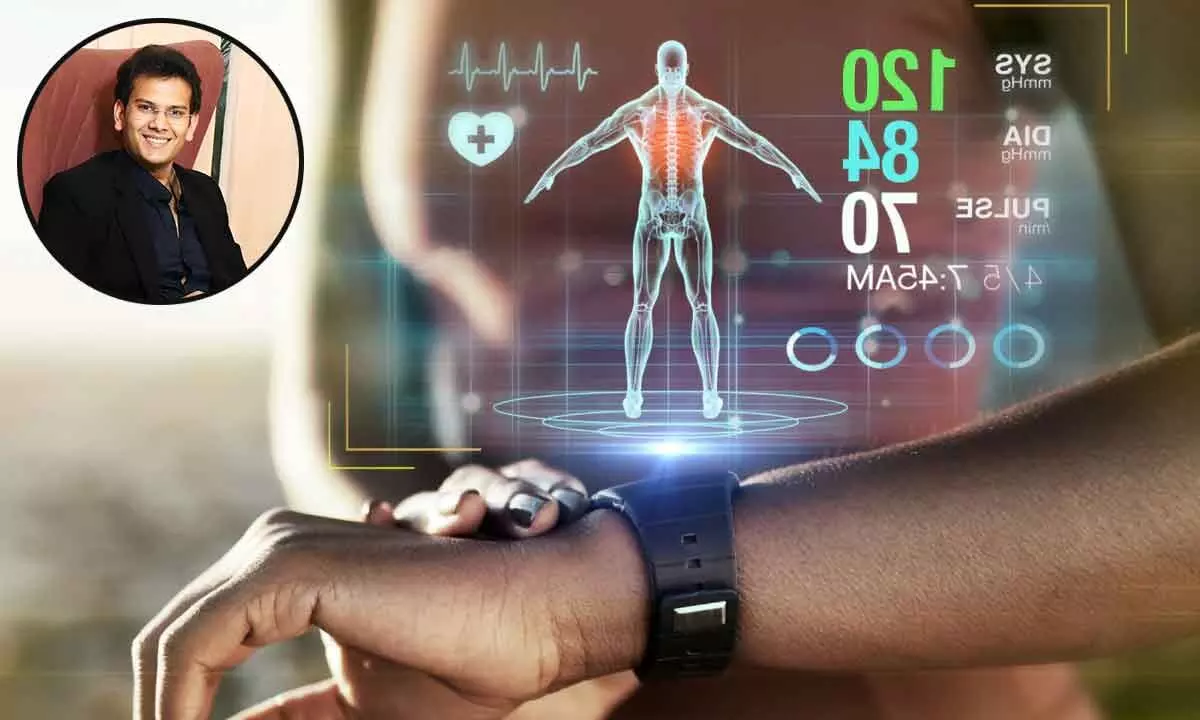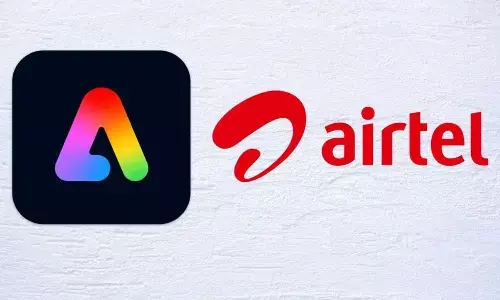How Wearable Technology is Revolutionizing Health and Fitness

Mr Udit Aggarwal discusses how wearable technology revolutionizes health, and fitness, offering personalized insights, continuous monitoring, and advanced future developments.
Wearable technology has rapidly emerged as a transformative force in the health and fitness industry. From smartwatches and fitness trackers to advanced biosensors, these devices are revolutionizing how we monitor our health, stay fit, and gain personalized insights into our well-being.
Mr Udit Aggarwal, CEO of Boston Levin
Mr Udit Aggarwal, CEO of Boston Levin, recently spoke to The Hans India about the transformative impact of wearable technology on health and fitness. In this discussion, Mr Aggarwal delves into the myriad benefits of wearable technology, its practical applications, and the exciting future developments to further enhance our health and fitness journeys. He shared with us the benefits, real-world applications and future developments of the wearable technology.
Benefits of Wearable Technology
Wearable technology offers numerous benefits that make it an indispensable tool for health and fitness enthusiasts. These devices provide real-time data and actionable insights that empower individuals to take control of their health.
1. Continuous Monitoring: Wearables provide continuous monitoring of vital health metrics such as heart rate, sleep patterns, and physical activity levels. This allows users to track their health data over time and identify trends or anomalies.
2. Personalized Insights: By analyzing the collected data, wearables offer personalized health insights and recommendations. These tailored suggestions help users make informed decisions about their lifestyle, diet, and exercise routines.
3. Motivation and Accountability: Fitness trackers and smartwatches often include features like goal setting, progress tracking, and social sharing. These tools motivate users to stay active and hold themselves accountable for their fitness goals.
4. Early Detection: Advanced wearables can detect early signs of health issues, such as irregular heartbeats or sleep apnea. Early detection allows for timely medical intervention, potentially preventing serious health problems.
Real-World Applications
The real-world applications of wearable technology in health and fitness are vast and varied. These devices are being used by individuals, healthcare providers, and fitness professionals to enhance health outcomes and promote active lifestyles.
1. Fitness Tracking: Devices like Fitbit, Boston Levin Infinity Smartwatch, and Apple Watch have become synonymous with fitness tracking. They monitor steps, distance, calories burned, and active minutes, helping users maintain an active lifestyle.
2. Health Monitoring: Wearables such as the Withings ScanWatch and the BioBeat wearable monitor vital signs including heart rate, blood pressure, and oxygen saturation. Apart from that smartwatches these days come with advanced health monitoring systems. These metrics are crucial for managing chronic conditions like hypertension and diabetes.
3. Sleep Analysis: Poor sleep quality is linked to numerous health issues. Sleep tracking and analysis devices track sleep stages and provide insights to improve sleep hygiene and overall well-being.
4. Stress Management: Wearables equipped with stress monitoring features measure physiological responses to stress. They offer guided breathing exercises and mindfulness activities to help users manage stress effectively.
5. Rehabilitation and Recovery: In the healthcare sector, wearables are used for rehabilitation and recovery. These wearable devices assist in tracking the progress of patients recovering from injuries or surgeries, providing valuable data to physiotherapists.
Future Developments
The future of wearable technology holds exciting possibilities, with ongoing advancements set to further revolutionize health and fitness.
1. Enhanced Accuracy: Future wearables will feature improved sensors and algorithms, providing even more accurate health metrics and insights. This will enhance the reliability of wearables as medical-grade devices.
2. Integration with Healthcare Systems: As wearables become more sophisticated, they will integrate seamlessly with electronic health records (EHRs) and healthcare systems. This will facilitate better communication between patients and healthcare providers and enable personalized treatment plans.
3. Advanced Biometrics: Next-generation wearables will incorporate advanced biometrics such as continuous glucose monitoring, hydration levels, and real-time blood pressure tracking. These features will offer a comprehensive view of an individual's health.
4. Artificial Intelligence: AI-powered wearables will analyze vast amounts of health data to provide predictive analytics and personalized recommendations. Machine learning algorithms will identify patterns and suggest proactive measures to maintain optimal health.
5. Wearable Ecosystems: Companies are developing ecosystems of interconnected wearable devices that work together to provide holistic health insights. For example, a smartwatch, smart scale, and smart nutrition tracker could collectively offer a complete picture of an individual's health.
Wearable technology is undeniably revolutionizing health and fitness by providing continuous monitoring, personalized insights, and motivation. Its real-world applications are already making significant impacts on individual health and the broader healthcare landscape. As technology advances, wearables will become even more integral to our daily lives, offering enhanced accuracy, advanced biometrics, and AI-powered analytics. The future of health and fitness is undoubtedly intertwined with the innovative potential of wearable technology, promising a healthier and more informed world.














